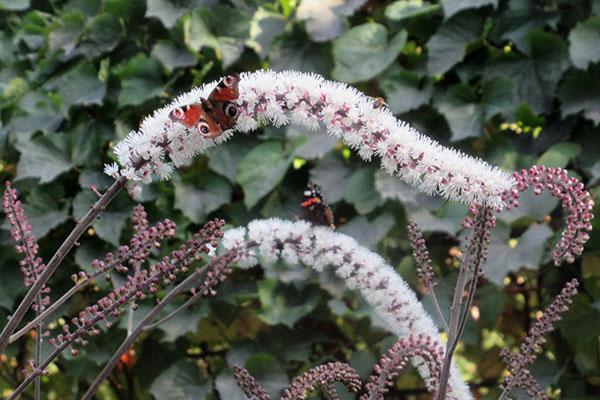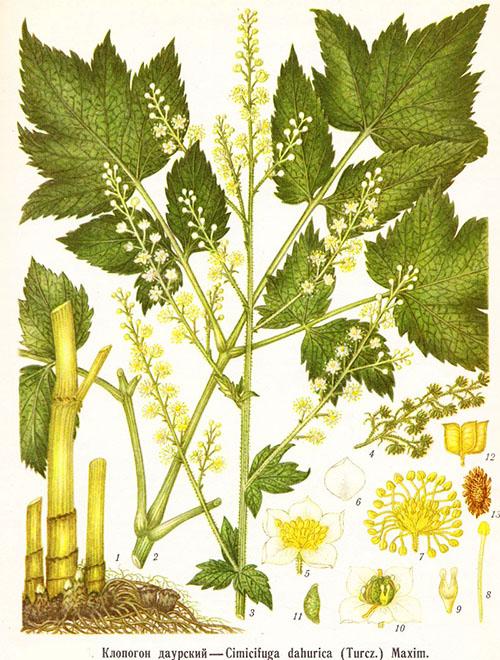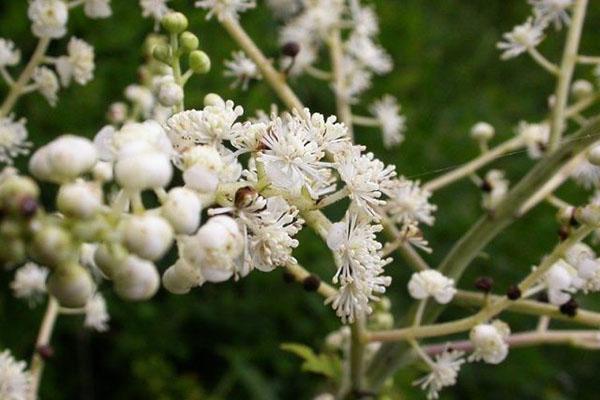Black cohosh grass at their summer cottage
 Black cohosh grass owes such a dissonant name to its properties to scare away herb bugs. This perennial herb grows in the Far East, the Chita region, as well as in the south of the Khabarovsk Territory. It can also be found in the wild, but Black Cohosh is often grown as a garden plant. Many peoples know firsthand about its healing properties, therefore they sow thickly on their plots.
Black cohosh grass owes such a dissonant name to its properties to scare away herb bugs. This perennial herb grows in the Far East, the Chita region, as well as in the south of the Khabarovsk Territory. It can also be found in the wild, but Black Cohosh is often grown as a garden plant. Many peoples know firsthand about its healing properties, therefore they sow thickly on their plots.
Description and chemical composition

The perennial boasts a rich chemical composition, due to which the plant is valued among adherents of traditional medicine:
- vitamin C;
- tannins;
- glycosides;
- acids;
- essential oils;
- flavonoids;
- tannin;
- resinous compounds.
Black Cohosh species
There are more than 20 species of this perennial plant. However, only a few varieties are considered common:
- Black cohosh is known in the Far East and China. A powerful and branched bush grows up to one meter. The stems of the plant are erect with a weak edge and beige inflorescences.

- Black cohosh is another known species. The bush of this perennial grows up to two meters. Inflorescences are creamy, pink and whitish. The foliage also surprises with colors: bronze, cherry or brown.

- Another species has a bright aroma - Tsimifuga racemose. The shrub is usually spreading and reaches two meters. The perennial blooms from mid-summer to autumn.

- For decorative purposes, another type is used - Black cohosh hearty. It grows up to one meter and forms heart-shaped leaves. Inflorescences 30 cm long have a beige tint.

- The shrub of Black Cohosh reaches one meter in height. The plant has small snow-white inflorescences. A characteristic feature of this species is the intolerance of excess moisture.

Black cohosh grass: useful properties and uses
 Klopon was also used for medicinal purposes by our ancestors. Extracts of this plant are in demand due to their calming, anti-inflammatory and analgesic effects. The healing properties of Klopogan cimifuga are often used in the treatment of symptoms associated with menopause. Perennial - a storehouse of salicylic acid, which is part of aspirin, due to which pain is relieved.
Klopon was also used for medicinal purposes by our ancestors. Extracts of this plant are in demand due to their calming, anti-inflammatory and analgesic effects. The healing properties of Klopogan cimifuga are often used in the treatment of symptoms associated with menopause. Perennial - a storehouse of salicylic acid, which is part of aspirin, due to which pain is relieved.
The plant also has the following properties:
- prevention of seasonal colds and increased immunity;
- therapy of gynecological diseases;
- antihypertensive effect;
- antispasmodic and diuretic properties;
- increased testosterone production;
- normalizes the work of the circulatory system;
- tannins promote tissue regeneration and wound healing;
- help with disturbed sleep.
 The medicinal perennial juice is used for eczema and other inflammatory processes on the skin. The use of Black Cohosh in medicine is in the treatment of bronchial asthma, migraines, oral infections, abscesses and diphtheria. Fresh leaves are pushed and used to relieve rheumatism and arthrosis.The extract of this plant is used in anti-sclerotic and antihypertensive medicinal preparations.
The medicinal perennial juice is used for eczema and other inflammatory processes on the skin. The use of Black Cohosh in medicine is in the treatment of bronchial asthma, migraines, oral infections, abscesses and diphtheria. Fresh leaves are pushed and used to relieve rheumatism and arthrosis.The extract of this plant is used in anti-sclerotic and antihypertensive medicinal preparations.
 However, Black Cohosh root is of the greatest value. Tinctures and decoctions on the roots are used to treat cardiovascular ailments, joint diseases, and muscle pain. Dry rhizome powder is in demand for neuralgia and sleep disorders, providing a calming and hypnotic effect. Also, on their basis, many people like to prepare teas and syrups, which have vasodilating properties.
However, Black Cohosh root is of the greatest value. Tinctures and decoctions on the roots are used to treat cardiovascular ailments, joint diseases, and muscle pain. Dry rhizome powder is in demand for neuralgia and sleep disorders, providing a calming and hypnotic effect. Also, on their basis, many people like to prepare teas and syrups, which have vasodilating properties.
Despite all the benefits in therapy and prevention, contraindications for use should also be taken into account. Since Black Cohosh grass is a poisonous plant, self-medication can be harmful to health. Preparations from the leaves or rhizomes of this perennial are not recommended for people with aspirin intolerance, as well as for pregnant and lactating women. In case of stroke and thrombosis, a mandatory consultation with a doctor is required. In case of an overdose, nausea, dizziness, weakness, and upset stools occur.
Collection and storage
 Stems and leaves, as a rule, are not dried, but used fresh. Only Black Cohosh roots are harvested. They must be dug up at the end of August, rinsed thoroughly and kept in the sun. Then the dried roots should be kept for one week in a well-ventilated area. Store the dry workpiece in linen bags, tin cans or paper bags. Black cohosh Daursky does not lose useful properties for two years.
Stems and leaves, as a rule, are not dried, but used fresh. Only Black Cohosh roots are harvested. They must be dug up at the end of August, rinsed thoroughly and kept in the sun. Then the dried roots should be kept for one week in a well-ventilated area. Store the dry workpiece in linen bags, tin cans or paper bags. Black cohosh Daursky does not lose useful properties for two years.